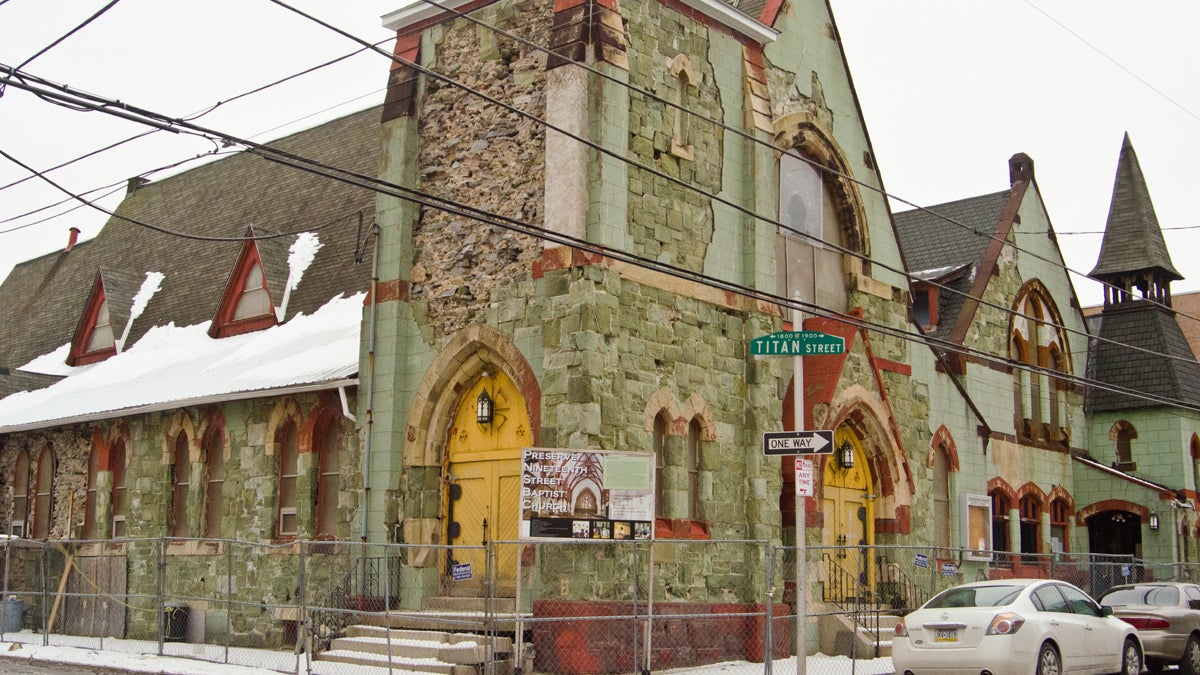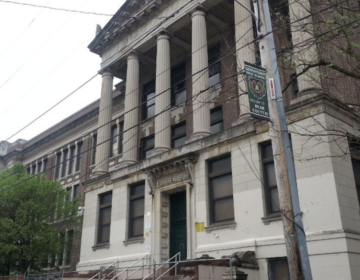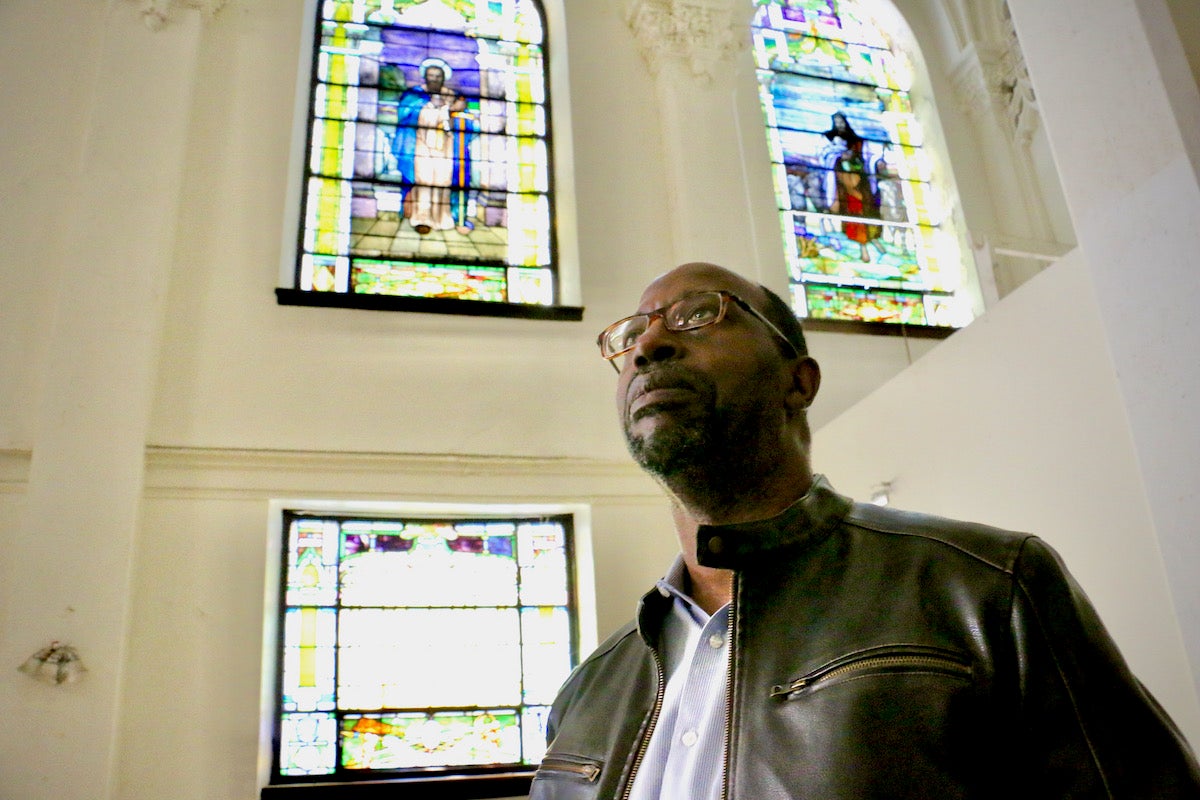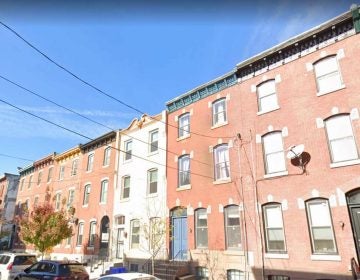City taskforce unveils new approach to preservation aimed at saving unrecognized Philly history
A spate of demolitions inspired city officials to think differently about how to save Philadelphia’s historic buildings.

The Frank Furness-designed 19th Street Baptist Church (Alex Lewis for WHYY)
This article originally appeared on PlanPhilly.
—
Historic buildings often get knocked down because owners can’t afford to keep them standing.
A package of legislative and regulatory reforms introduced by Mayor Jim Kenney and other city leaders Thursday aims to lessen that burden and encourage preservation in Philadelphia neighborhoods, including many with unrecognized and increasingly vulnerable treasures.
The move comes after years of heated debate and neighborhood conflict over reconciling the city’s historic character with its latest development boom.
“[We will] elevate the one thing that Philadelphia has that no other city can imagine and that’s our fabulous history,”said Mayor Jim Kenney flanked by City Councilman Mark Squilla and other city leaders at a press conference Thursday.
The conference marked the culmination of Kenney’s Historic Preservation Task Force, a 33-member body that worked for the past two years to create a set of recommendations intended to improve the city’s ability to protect historic assets from demolition and other threats.
Among the most notable proposals was one that seeks to create new tiers of historic districts. A tiered system would allow the city to protect more properties while lessening the burden on owners of creaky old buildings that can be costly to maintain, officials said. Approaching preservation with an eye to equity was one of the goals of the task force and this idea could be a way to help property owners on limited incomes protect their asset without going broke.
“The tiering option [allows] regulations assigned for each district. Some will be more restrictive and some less, but it gives us the opportunity to engage more parts of the city,” said Squilla.
Other proposals outlined by officials include a citywide survey to identify Philadelphia’s unprotected historic resources. Such a survey would allow preservation advocates to concentrate their attention on endangered and notable buildings.
Another proposal would create a zoning bonus to allow developers to build larger and denser structures in exchange for paying into a new historic preservation fund.
An additional incentive proposed would reduce parking minimums for historic renovation projects while another would allow for smaller apartments — accessory dwelling units — in historically significant homes.
The revenue generated by the so-called ADUs could help pay for upkeep of aging homes, advocates said.
An index to guard against demolition
The city also announced a plan for an index of potentially historically significant properties that can’t be demolished without increased review. If the plan moves forward, developers seeking to demolish properties listed on the index would be denied permits until the Historical Commission considers the site’s eligibility for protection. Advocates want the list made quickly, to act as a safeguard until the proposed citywide survey of unprotected buildings is complete.
“If someone tried to pull a demolition permit it would be flagged by the Department of Licenses and Inspections and reviewed by the committee for designation,” said Dominique Hawkins, preservation architect and co-chair of the task force.
There is no timeline for the index yet.
Some of the policies outlined at the press conference would only require action from the Kenney administration. For instance, the survey of unprotected buildings would not demand City Council legislation, nor would the creation of a multi-tier district system.
On the other side, the demolition-prevention index would require enabling legislation from City Council as would incentives such as the proposed zoning bonus, parking minimum reduction and ADU allowance.
Councilmember Mark Squilla professed himself eager to introduce the necessary bills.
“Reducing or eliminating parking minimums for historic buildings, that’s a sometimes controversial idea, but if we are serious about preserving our history we have to put some of these incentives in place,” said Squilla. “If people see we are serious about helping them, they will be more than willing to have their property designated historic.”
One possibility that provoked debate was a proposal for reforming the 10-year property tax abatement to encourage preservation.
The city now offers tax abatements for rehab projects but a larger break can be won by demolishing a building and throwing up a new structure.
But there are currently six abatement reform proposals floating around City Council and adding another to the debate didn’t seem to be on the agenda.
“That’s not one of the ones on our first to-do list,” said Squilla. “It’s a recommendation of the task force to look at that and it’s on our list of things to look at.”
Squilla said that the ideas announced today would be among the least controversial, and that he hoped their presumed success would put momentum behind more contested preservation ideas.
Many preservation advocates in attendance offered cautious optimism about the developments.
“It sounds pretty good but I haven’t seen it [the legislation] yet and one little word could change everything,” said Oscar Beisert, a preservationist who spearheaded a surge in historic nominations after years of stagnation in Philadelphia’s Historical Commission.
Beisert is also a task force member and he especially praised the proposal to eliminate or reduce parking minimums and to allow the construction of apartments in historic residential buildings.
“Accessory dwelling is really important,” said Beisert. “If you have the rent from a unit you can use it to help maintain your house. It allows you to put a little more love into an older building.”
WHYY is your source for fact-based, in-depth journalism and information. As a nonprofit organization, we rely on financial support from readers like you. Please give today.







